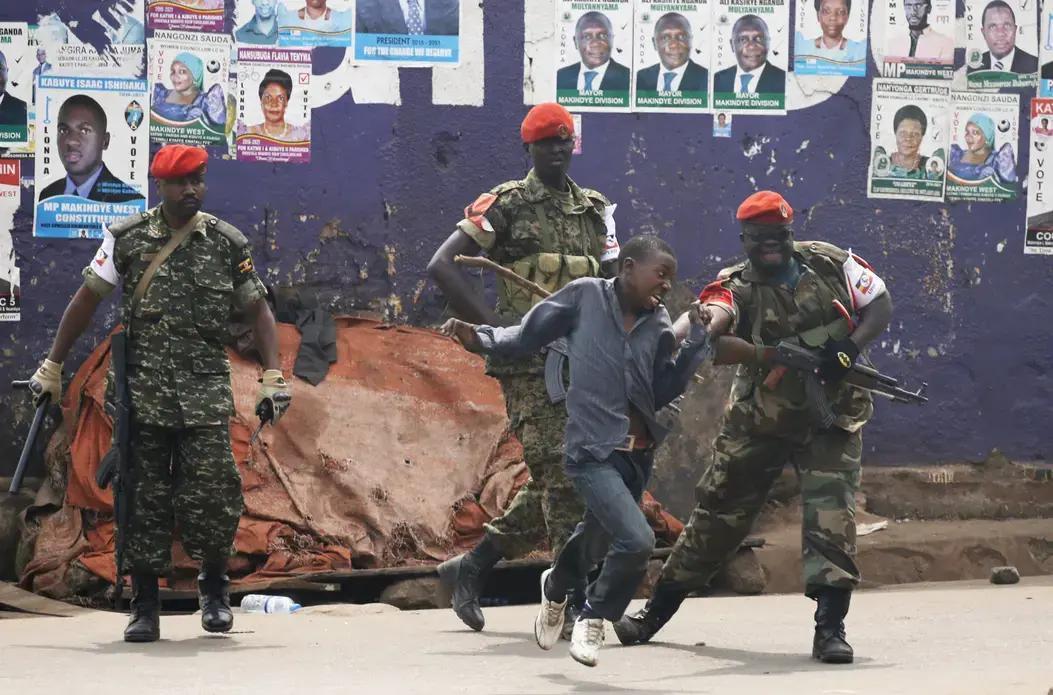Africa-Press – Uganda. A sweeping new exposé titled “Guns Everywhere!: The Military and Transition Politics in Uganda” has laid bare the deep and expanding influence of Uganda’s military across virtually all spheres of national life—from politics and the economy to law enforcement, religion, and culture.
The report, authored by Godber Tumushabe, Andrew Karamagi, and a team of researchers, is the product of a seven-month investigation employing academic frameworks, interviews, and policy analysis to map what they call Uganda’s “parallel military government.”
“The military is no longer a shadow actor,” the authors argue. “It is a dominant force—by the military, for the military, and through the military.”
At the heart of the investigation is the transformation of the National Resistance Army (NRA), which seized power in 1986, into today’s Uganda People’s Defence Forces (UPDF).
Though originally cast as a “people’s army” with a strong code of conduct, the study argues that the UPDF has not departed from the traditions of past armed regimes and instead entrenched itself at the core of state power.
A focal point is the Special Forces Command (SFC), described as “an army within an army.” Initially established to protect the Head of State, the SFC has evolved into a powerful formation handling strategic national security roles.
The report traces its trajectory to what it calls a “curious lineup of commanders,” with particular focus on General Muhoozi Kainerugaba, Chief of Defence Forces and son of President Museveni.
“His leadership marks a defining reflection point,” the report notes, drawing comparisons to dynastic politics in countries like Gabon, Equatorial Guinea, Togo, and Chad.
Uganda’s military, with an active force of around 45,000 as of 2022 and plans to recruit an additional 11,500 troops by the end of 2025, continues to expand its footprint.
Military spending in 2022 stood at $0.92 billion—2.06% of the nation’s GDP.
The report documents what it describes as a “military-industrial complex” dominating Uganda’s public institutions and policy landscape.
A full chapter is dedicated to the military’s role in influencing foreign policy, elections, civil society, and the judiciary.
It highlights the continued trial of civilians by military courts, despite a Supreme Court ruling in January 2025 that declared such practices unconstitutional.
The exposé also critiques recent legislation passed by Parliament in May 2025 permitting military trials for civilians—an act Human Rights Watch condemned as a major setback for civil liberties.
Among the study’s most sobering conclusions is the projection of Uganda’s future under what the authors call the “Warrior Mad King” scenario—an allusion to a regime defined by unchecked presidential authority and intensified repression under the leadership of both President Museveni and his son.
Andrew Karamagi, one of the co-authors, described the current regime as marked by “centralized power, political repression, and an elaborate patronage system that excludes dissent and rewards loyalty.”
He noted that “divide-and-rule tactics, the use of force, and suppression of civil liberties have become tools of governance.”
Key findings from the study include:
The gradual erosion of the 1995 Constitution’s principle of military subordination to civilian authority (Article 208).
The use of the UPDF and affiliated groups for partisan violence, especially against political opposition.
The military’s entrenchment in civic life—from churches and cultural institutions to local economies and policing.
A governance model that mirrors hybrid regimes in other parts of Africa, such as Equatorial Guinea and Togo.
Co-author Godber Tumushabe acknowledged the evolving nature of the research subject.
“When we started, we underestimated how fluid this issue would be. Every week brought new developments, often from all arms of government,” he said.
“Still, we hope this report contributes meaningfully to the understanding of Uganda’s transition politics.”
The study, which draws on policy documents, civil society reports, and interviews with experts and insiders, calls for urgent reforms to reverse what it calls the militarization of the state.
In its final remarks, the report states: “It is an indictment of the nature and quality of Uganda’s political journey that four Constitutions later, the gun is yet to be subordinated to civilian control.”
While acknowledging the UPDF’s role in national security and territorial integrity, the authors argue that its credibility has been undermined by its use in political repression and partisan enforcement.
“Uganda’s men and women in uniform deserve better than to be used as tools of political expediency,” the study says.
Source: Nilepost News
For More News And Analysis About Uganda Follow Africa-Press






